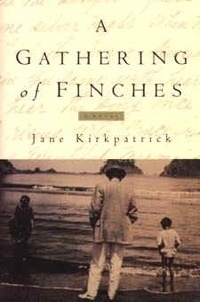I first heard Jane Kirkpatrick’s name in a conference planning meeting, when one of our members suggested her as a main speaker. Always interested in historical fiction, I immediately ran to the library to check out her books. What I have read so far has impressed me. Jane is a meticulous historian who somehow manages to capture the characters of people who lived hundreds of years ago. She records their stories in a way that makes history come alive.
 A Gathering of Finches is based on the story of Cassie Hendrick Stearns Simpson, a pioneer woman in Oregon in the 1900s. Kirkpatrick traces Cassie’s story from her childhood in New York to her trip across America with new husband and her adulthood (and relationships) in Oregon.
A Gathering of Finches is based on the story of Cassie Hendrick Stearns Simpson, a pioneer woman in Oregon in the 1900s. Kirkpatrick traces Cassie’s story from her childhood in New York to her trip across America with new husband and her adulthood (and relationships) in Oregon.
Cassie grows up in New York and marries her first husband at age 18, just after her father’s death, and follows him out to the west coast. Her husband loves and admires her, but Cassie is unable to return his love, turning to other things to fill the void she feels inside. She goes to suffragette meetings, rides her horse, parties as hard as she can, yet none of it fulfills her.
A severe illness following the birth of her first and only child in New York distances Cassie from her daughter. The illness also reveals the heart condition that will plague her for the rest of her life and eventually cause her death. Life goes on as Cassie returns to Oregon with her daughter and a friend in tow. Finally, in her late twenties, Cassie falls in love—with Louis Simpson, a handsome, dashing man several years her junior.
Theirs is an intense, passionate love affair that eventually causes Cassie’s divorce. She leaves town with Louis and they start a new life together, pretending they are married. Yet that lie, and the other secrets they hold, push them apart. Cassie pursues her pleasures, doing whatever she wants while Louis keeps busy with his projects about the town. One almost wonders how someone can be as self-centered and blind as Cassie, and yet at the same time, it is easy to understand the way she brushes things aside and does not want to deal with anything that could be difficult.
At a turning point in Cassie’s life, as she begins to realize what joy there is in loving and giving to others, Kirkpatrick borrows a technique from Wilkie Colllins by switching narrators. Most of the story is told in first-person by Cassie, but here Kirkpatrick gives us the viewpoints and opinions of several other characters, including Louis. These provide additional insights into her story and character. Lottie, Cassie’s maid, appears and is also the narrator at the end of the story, giving the closing moments of Cassie’s life.
Jane’s exhaustive research into Cassie’s life is evident throughout the novel. The details of Cassie’s everyday life bring the story alive, along with Jane’s ability to inhabit Cassie’s head and imagine her thoughts and feelings.
On her blog, Jane talks about what she learned from Cassie: “What I loved about discovering her life was how she redeemed herself with her daughter and also how she gave back to the community by working tirelessly to raise funds for the refugees in World War I. Today, we can all visit Shore Acres State Park on the Oregon Coast and see the garden her husband developed for her. Five acres of absolute beauty and respite. Cassie reminded me that we all make mistakes and it’s what we do about them that matters.”
Jane Kirkpatrick is a writer, speaker and teacher who has published over twenty books. Many of her novels are historical fiction that trace the untold stories of the women who had a large impact upon American’s history, such as Cassie in Oregon and Ivy Cromartie Stranahan in Florida. Jane grew up in Wisconsin and now lives in Oregon with her husband. She has a master’s degree in social work. For more information about Jane or her books, visit her website.
One thing I found fascinating about the whole story was the fact that, while it is fiction, it is fiction based upon fact. The author even discusses how she gathered her information and what is based on fact in an afterword to the novel. I found myself constantly remembering that most of what I was reading actually happened—Cassie really did all of that. This brought an added dimension to the story and to Kirkpatrick’s skill in portraying Cassie’s motives, passions, and life.

One Response
Jane Kirkpatrick is a lovely, lovely person. I heard her several years ago and wept when she talked about being called to write. She said that when you make the first step, unimaginable things will happen that would not have been possible if you hadn’t taken action. For a new writer that gave me courage to begin submitting, and I learned the beautiful truth of that. I hope you get to hear her speak at the conference. Absorb her wisdom.